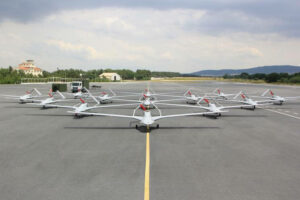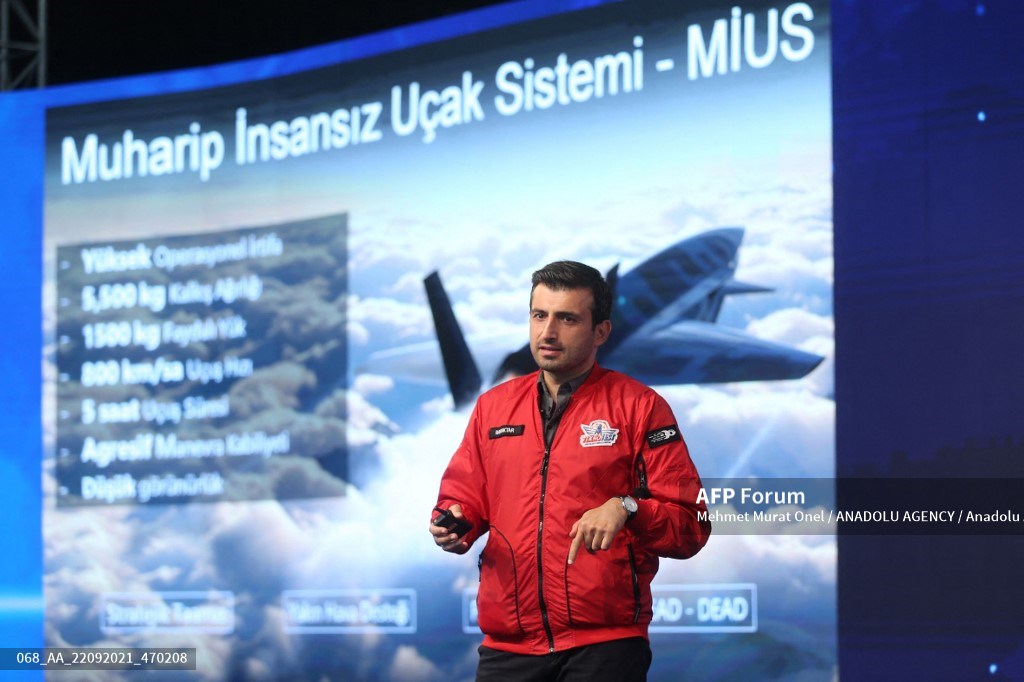Turkey’s Presidency of Defense Industry (SSB), the government’s defense procurement agency, strongly defended Baykar, a prominent defense contractor owned by President Recep Tayyip Erdoğan’s in-laws, after the Baykar CEO traded barbs with opposition politicians.
Kamuoyuna duyurulur! pic.twitter.com/zreVPECaJQ
— SSB (@SavunmaSanayii) April 15, 2024
The statement came after Baykar CEO Haluk Bayraktar claimed that İstanbul Mayor Ekrem İmamoğlu’s communications team had orchestrated a smear campaign over the company’s alleged sales of jet fuel to Israel.
Baykar, which is known for manufacturing the TB2 combat drones, came under scrutiny after allegations spread on social media platforms claiming that Baykar was involved in the sale of jet fuel to Israel.
CEO Haluk Bayraktar, the elder brother of Selçuk Bayraktar, Erdoğan’s son-in-law, has vehemently denied the allegations and accused İmamoğlu of defamation.
Clash for post-Erdoğan Turkey
Local elections were held in Turkey on March 31, which saw the main opposition Republican People’s Party (CHP) outperform the ruling Justice and Development Party (AKP), led by President Erdoğan, a historic first.
The CHP’s candidate for mayor of İstanbul, Ekrem İmamoğlu, won against Murat Kurum of the AKP. This was İmamoğlu’s third victory in the mayoral elections in İstanbul against AKP candidates.
This not only cemented İmamoğlu’s political standing but also positioned him as a potential contender in future presidential elections.
Recent trade restrictions imposed on Israel by Turkey following the ongoing military operations in the Gaza Strip affected certain goods, including jet fuel.
On Sunday Evren Barış Yavuz, a political communications expert, was arrested on charges of “spreading misleading information to the public” and “propaganda for a terrorist organization” after he posted a photo of Haluk and Selçuk Bayraktar on social media with the caption “They sold jet fuel.”
What Haluk Bayraktar describes as a plot against Baykar at the behest of İmamoğlu was triggered by Yavuz’s tweet, for which he was arrested.

Yavuz defended himself, stating that he had no connection to the İstanbul Metropolitan Municipality and İmamoğlu and that he did not write a controversial article titled “Why Alevis [a sizable religious minority in Turkey] should have their own PKK [outlawed Kurdistan Workers’ Party]” which Haluk Bayraktar used to attack İmamoğlu.
Allegations against Baykar were particularly controversial as they came at a time when anti-Israel sentiment in Turkey has been running high since Israel began pounding Gaza in retaliation for an unprecedented attack by the militant group Hamas in southern Israel on October 7, which claimed about 1,200 lives and led to the taking of some 250 hostages.
On April 6, 133 hostages were still in captivity in the Gaza Strip, 129 of whom had been abducted on October 7.
According to the Gaza Health Ministry, the death toll in the Gaza Strip has now exceeded 34,200.
In a statement, Haluk Bayraktar defended the integrity of Baykar and criticized the attacks on his company as unfounded and malicious. “Our nation and the people of Gaza know our stance well; these unfounded slanders will not tarnish our reputation,” Bayraktar said. He accused İmamoğlu’s team of using misleading tactics to undermine Baykar’s contribution to Turkey’s defense capabilities.

The SSB’s defense of Baykar is noteworthy because the organization has traditionally overseen and supported the development of Turkey’s defense sector rather than defending individual companies, particularly those that are privately owned.
The move has been seen by many as a sign of how the Turkish state is being hollowed out by Erdoğan-friendly bureaucrats who are dropping any pretense of neutrality to defend a company owned by Erdoğan’s in-laws.
Critics allege that Baykar has been given preferential treatment in defense tenders at the expense of state-owned competitors such as Turkish Aerospace Industries (TAI), amid broader accusations of nepotism and cronyism in Turkey’s defense business.
The SSB responded to the allegations against Baykar on social media. The SSB’s statement highlighted that more than 500 companies were supported in various programs that included more than 400 delivery projects and for which nearly 6 billion Turkish lira were allocated.
The SSB claimed that Baykar never applied for or availed itself of any financial incentives, grants or support programs from the government in its rebuttal allegations of preferential treatment.
SSB said that despite his significant contribution to the national economy, Baykar is facing what it described as “mala fide [bad faith] intent.”
The SSB’s claim that Turkey’s defense industry should not be “exploited for profane political purposes” ironically points to a deeper politicization, according to critics, in which state resources are mobilized to protect a company owned by the president’s in-laws.
President Erdoğan has in the past positioned himself as a staunch supporter of Palestinian rights, which contrasts with the alleged dealings in which his in-laws’ company is involved. This has not gone unnoticed by the Turkish public and the opposition, who continue to question Erdoğan’s policies both domestically and in foreign affairs, with many viewing last week’s trade restrictions as a direct result of public pressure.
İstanbul’s Metropolitan Municipality, led by Mayor İmamoğlu, has also filed a lawsuit against Haluk Bayraktar for defamation, following the latter’s accusations.
